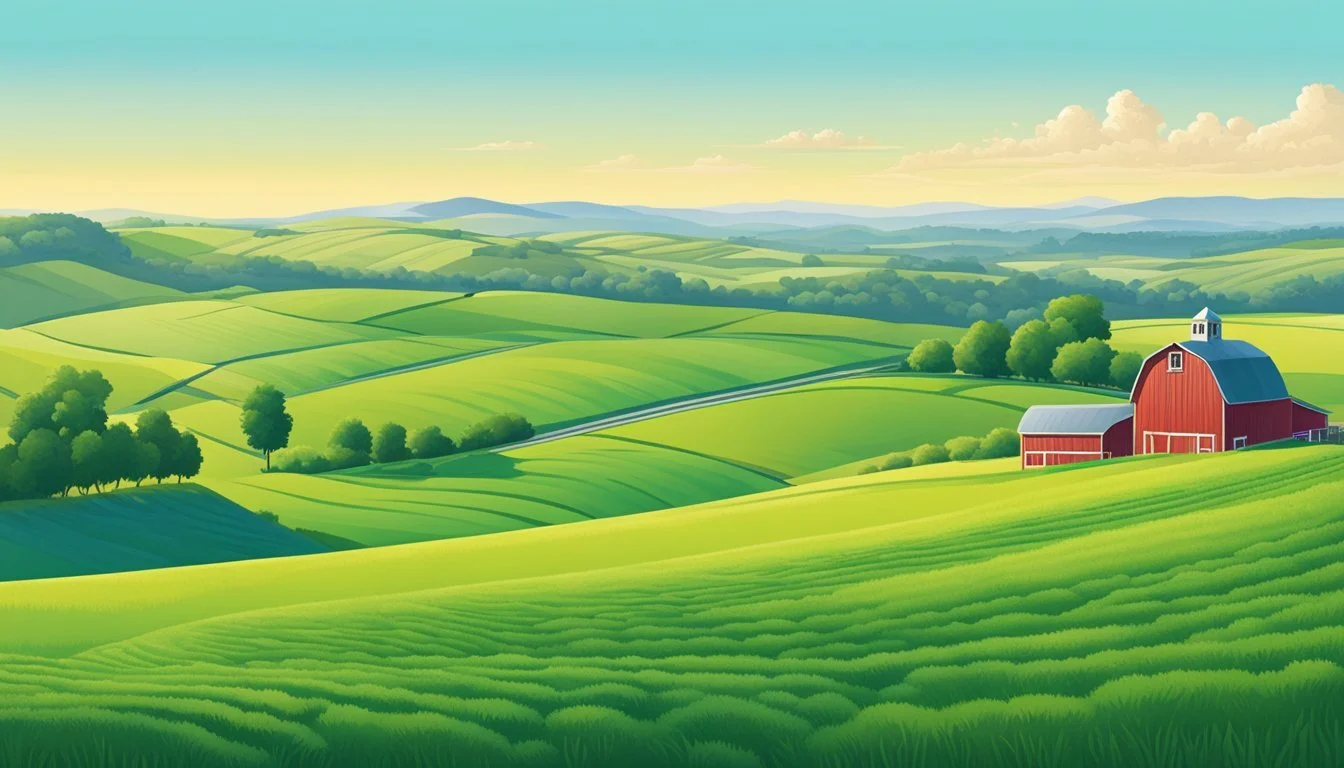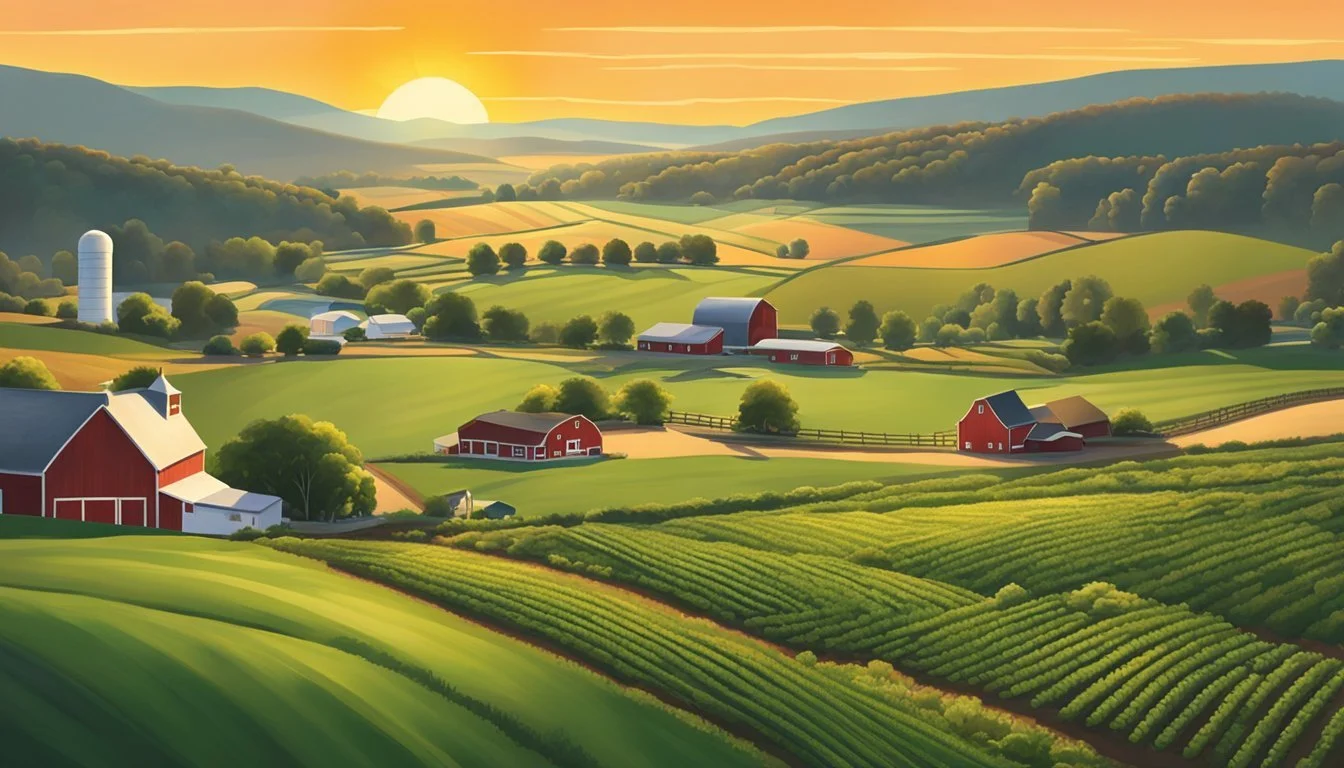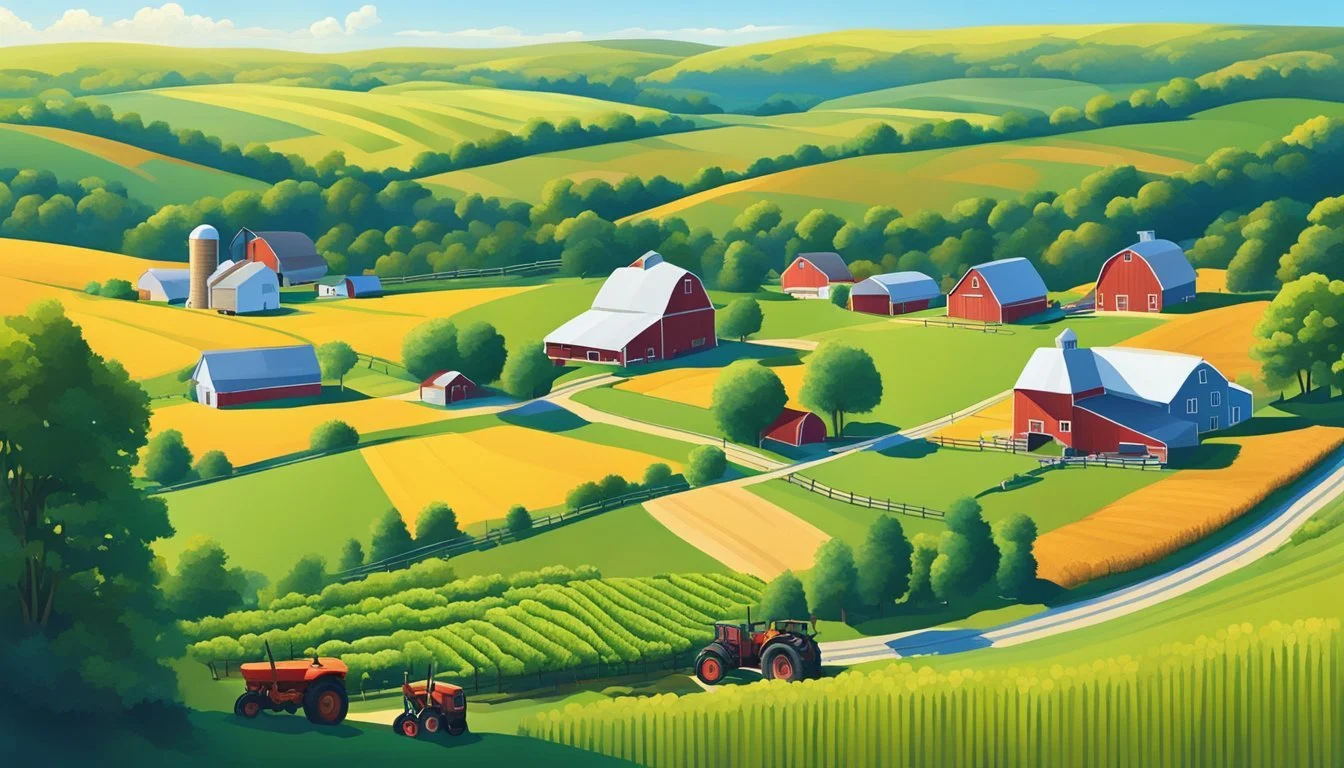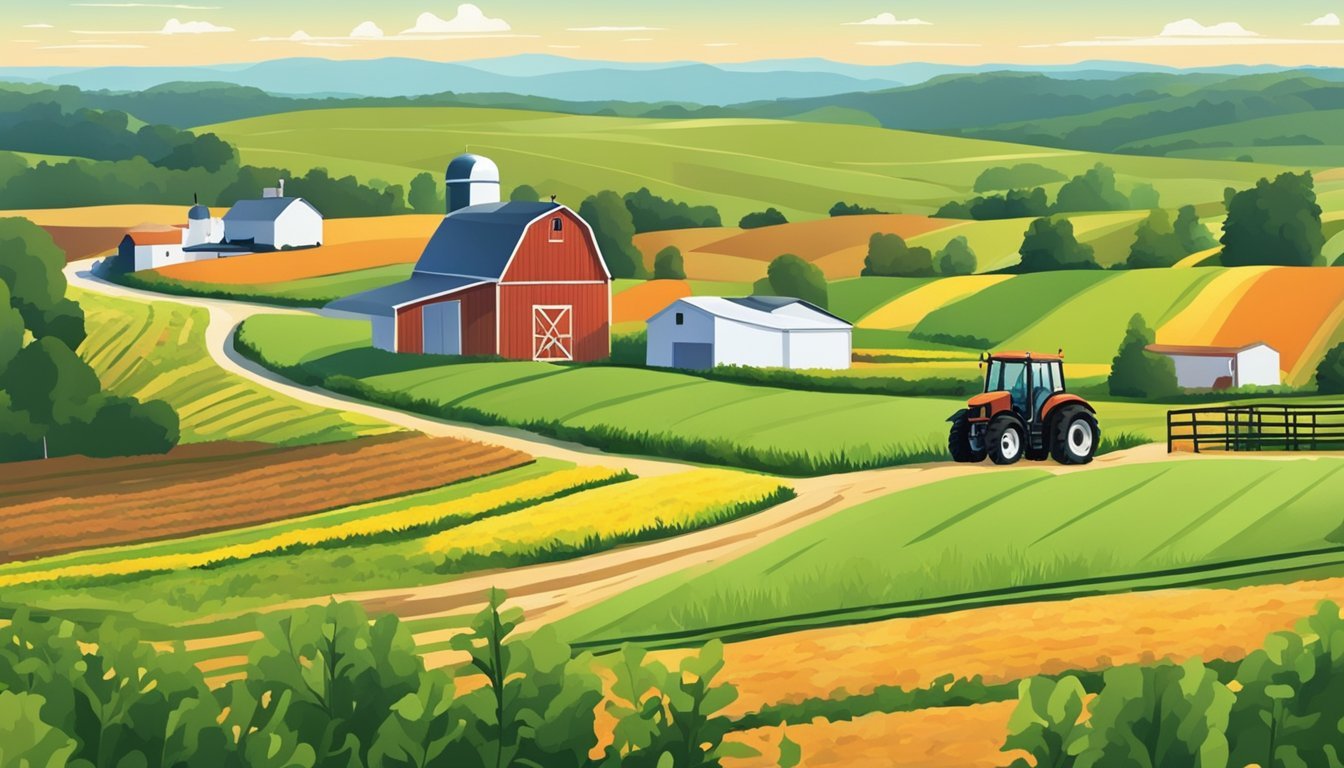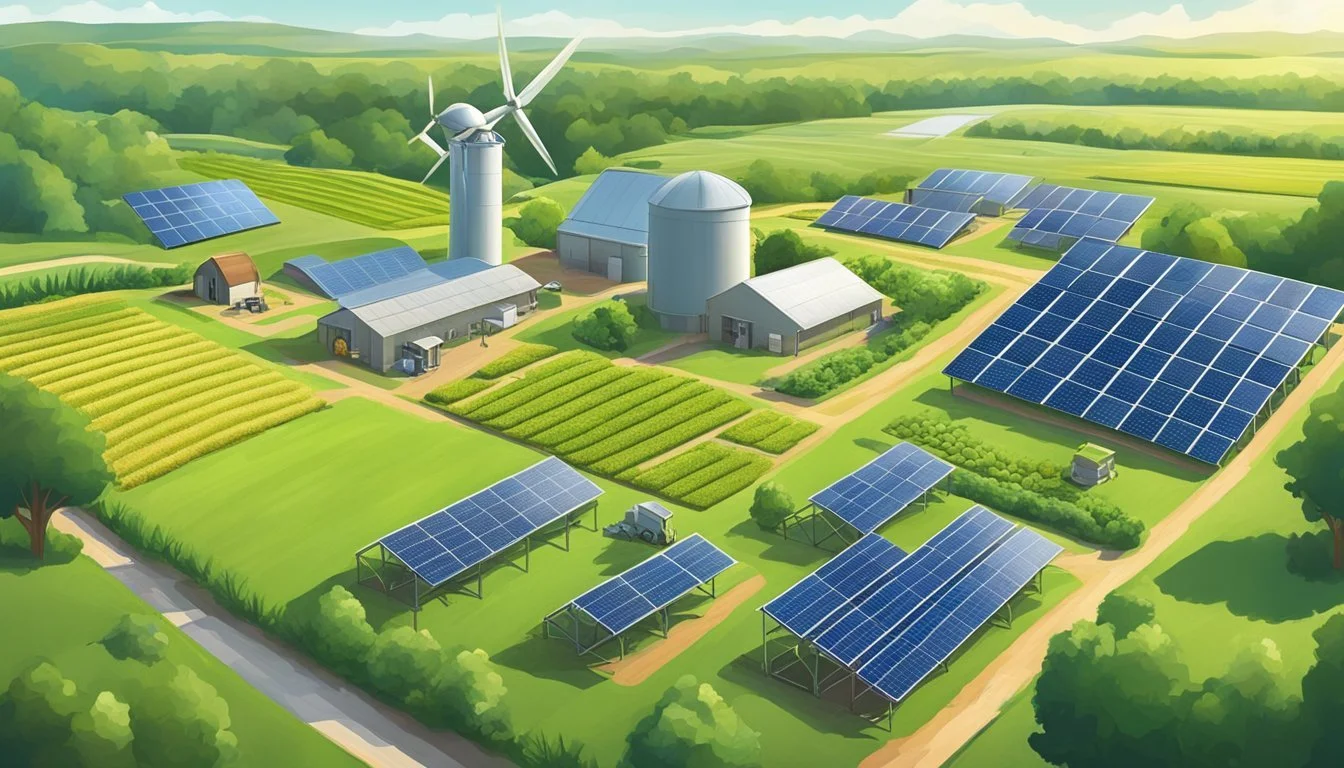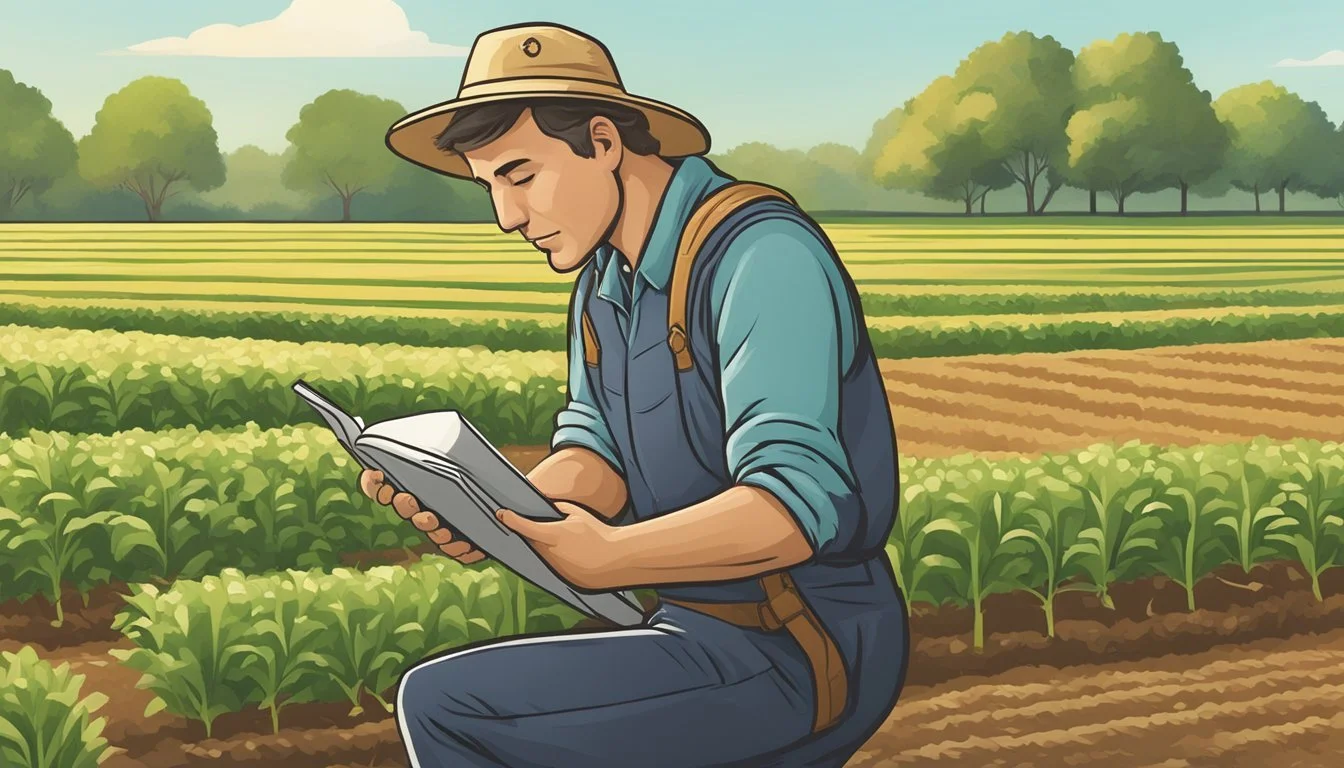Guide to Farming in Delaware
Essential Strategies for Success
This Article is Part of Our State by State Farming Guide
Delaware's rich agricultural sector serves as the cornerstone of its economy, underpinned by a long tradition of farming that stretches across generations. With about 2,500 farms occupying over 500,000 acres of its land, the state has cemented its status as a key player in providing farm-fresh products to both local and wider markets. The favorable climate and fertile soil, including the signature Greenwich loam, create ideal conditions for a diverse range of crops.
Agricultural practice in Delaware is characterized by a focus on both innovation and tradition, ensuring sustainability and profitability. Farmers in Delaware invest in both large-scale and small family-run operations, with an emphasis on crop diversity that includes soybeans, (how long do soybeans last?) corn, and a variety of fruits and vegetables. This diversification is augmented by local initiatives, such as the “Buy Local Delaware” campaign, which highlights the importance of supporting local farmers, thereby strengthening the state’s economy and community health.
Farmers' markets and direct farm sales play a vital part in Delaware's agriculture, enabling consumers to source the freshest produce while engaging with the individuals who grow their food. This direct farm-to-table approach not only sustains small-scale farmers but also fosters a closer relationship between consumers and the origins of their food, highlighting the value of fresh, local produce. Seasonal u-pick experiences further invite the public to participate directly in the harvest of fruits, vegetables, and festive seasonal items like pumpkins and Christmas trees.
Understanding Delaware Agriculture
Delaware agriculture has been the cornerstone of the state's economy and cultural heritage. Its presence is known for diverse farm products and a landscape shaped by generations of farmers.
History of Farming in Delaware
Delaware, known as the First State, has a rich timeline where agriculture played a pivotal role in both settlement and economic development. As early as the 1600s, farming took root with Swedish settlers who introduced crops like wheat, barley, and corn. Livestock such as pigs, sheep, and cattle were also raised.
The Role of Agriculture in the Economy
Agriculture remains Delaware’s largest industry, significantly impacting the state’s economy. Farming operations generate over $1 billion in income, reflecting a robust sector that underpins the economic structure of the state. A mix of traditional and modern methods continues to optimize economic growth.
Delaware's Agricultural Landscape
In Delaware, the agricultural landscape is diverse, consisting of:
Poultry: A leading farm product, particularly broiler chicken.
Crops: Including soybeans, corn, and an array of fruits and vegetables.
Livestock: Aside from poultry, dairy and beef cattle contribute to the state's farm products.
This variety benefits the market and supports a steady supply for both local consumption and export.
Crops and Livestock
Delaware's agricultural landscape is defined by its vibrant crop production and flourishing livestock and poultry sectors, with corn leading the cultivation efforts and broilers representing the most valuable agricultural product.
Corn: Delaware's Top Crop
Corn thrives across Delaware, occupying a significant portion of the agricultural land. As the top crop, corn's production is vital for both the state's economy and its role in supporting the livestock industry.
Soybeans and Wheat Cultivation
Soybeans and wheat serve as important staples in Delaware's crop rotation. They are cultivated extensively, providing diversity and sustainability to the state's farming activities.
Fruit Farming: Apples, Peaches, and More
Delaware's fertile soil supports a variety of fruit crops. Apples lead as the primary fruit crop, but the state also enjoys productive harvests of peaches and other fruit varieties, contributing to the state's agricultural diversity.
Livestock and Poultry: Broilers, Dairy, and Eggs
The state's livestock sector is headlined by its broiler chicken production, which stands out as the most valuable product in Delaware's agricultural portfolio. The dairy industry and egg production also play critical parts, with many farms contributing to these sectors.
Agri-Business in Delaware
Agriculture is both a traditional activity and a modern business sector in Delaware, where agribusiness connects farming with markets to benefit businesses, consumers, and the local economy. The support structure for farmers ranges from marketing assistance to programs encouraging the direct sale of farm products to consumers.
Connecting Farmers and Markets
Farmers in Delaware have access to various resources to help expand their reach to local and regional markets. The state provides support to businesses looking to incorporate Delaware Grown produce into their venues, facilitating connections between producers and buyers. Markets, including farmers markets, play a crucial role in this ecosystem by offering farmers platforms to sell their goods directly to consumers.
Community Supported Agriculture (CSA)
Community Supported Agriculture (CSA) is a popular model in Delaware, where consumers subscribe to the harvest of a specific farm or group of farms. This structure benefits both consumers and Delaware farms, as it provides a steady market for farmers while ensuring fresh produce for consumers throughout the farming season.
The Importance of Buying Local
Buying local is emphasized in Delaware's agriculture sector as it supports the state's economy and leads to fresher options for consumers. Local purchases from Delaware farms ensure the best quality farm products and help sustain the agricultural community. Consumers are encouraged to engage in buying local to enjoy products like Christmas trees, fresh produce, meats, and eggs directly from the farms.
Consumer Resources
Delaware offers a variety of resources for consumers interested in supporting local agriculture. From farm stands and markets to educational materials and community events, residents and visitors have numerous opportunities to connect with the state's farming community.
Finding Farm Stands and Markets
Farm Stands: Consumers looking for fresh, locally grown produce can visit various farm stands throughout the state. Popular days for farm stand visits are Saturdays and Sundays, when most are open and stocked with fresh goods.
Lewes: Hosts a well-known market with a variety of local vendors.
Greenwood: Another location where individuals can find farm fresh items directly from growers.
A complete list of farm stands and their operating hours can be found on the Delaware Department of Agriculture's website or their Facebook page.
Markets:
Laurel: Home to markets that showcase local produce and artisanal goods.
Consumers can use the Buy Local Guide to discover markets in their area and to support Delaware businesses while enjoying the freshest products.
Educational Resources and Information
The Delaware Department of Agriculture provides a wealth of information for consumers to learn about the state's agricultural history and current practices.
Website Resources:
Detailed farm regulations and agricultural leases codes can be found on the official department site for those interested in learning about the legal side of Delaware agriculture.
Delawaregrown.com offers insights into Delaware Grown products, spotlighting the journey from farm to table.
Additionally, local extension services from universities such as the University of Delaware and Delaware State University supply research-based educational materials.
Community Events and Agricultural Demonstrations
Community events and agricultural demonstrations play a crucial part in consumer education and engagement with Delaware's farming industry.
Events:
The Delaware State Fair and the Delaware Agricultural Industry Dinner are annual events where consumers can immerse themselves in the local agricultural community.
Educational events like Delaware Ag Week and University of Delaware Ag Day offer demonstrations and activities related to farming and food production.
Agricultural Demonstrations:
These are often held on certain weekends and provide hands-on experiences for all ages, with a focus on showing the importance of agriculture in everyday life.
Participation in these events fosters a deeper understanding and appreciation for Delaware’s agricultural heritage and current farming practices.
Sustainability and Future of Farming
The future sustainability of farming in Delaware hinges on both conserving existing farmland and embracing advancements and innovations within the sector.
Conserving Farmland for the Future
In Delaware, the pressure to build and develop land is ever-present, yet the state remains committed to preserving its agricultural legacy. Strategies for conserving farmland include zoning regulations that protect agricultural resources and programs designed to support farmers in retaining their land for agricultural use. This dual approach helps ensure Delaware's farmland persists for future generations.
Conservation efforts in Delaware:
Zoning Regulations: Protect the agricultural characteristics of rural Delaware.
Support Programs: Financial incentives for farmers to keep land dedicated to farming.
Advancements and Innovations in Farming
Delaware is also witnessing a surge in agricultural innovation with ventures in vertical farming poised as harbingers of urban agricultural transformation. These developments aim to make farming more sustainable and environmentally friendly. For example, operations like Second Chances Farm focus not only on agricultural sustainability but also on social sustainability by providing opportunities for formerly incarcerated individuals.
Innovations in Delaware agriculture:
Vertical Farming: High-density farming with a smaller land footprint, optimizing space in urban environments.
Regenerative Agriculture: Practices that restore soil health, improve water retention, and enhance biodiversity.
By supporting conservation and innovation, Delaware positions itself at the forefront of sustainable and resilient agricultural practices.
Specialty Farming and Niche Markets
Delaware’s agricultural landscape is diversifying with specialty farming and niche markets, promoting sustainability and meeting consumer demand for unique and high-quality products. Farmers in the state are increasingly adopting models that cater to specialized sectors within agriculture.
The Rise of Christmas Tree Farming
In Delaware, Christmas tree farming has become a popular niche market, with several farms dedicating acreage to grow varieties like Douglas Fir and Blue Spruce. These farms not only contribute to the holiday spirit but also add to the state's agricultural diversity. Customers often prefer fresh, locally grown Christmas trees for their festive celebrations, appreciating the sustainability and authenticity they offer.
Organic Farms and Health Foods
The demand for organic produce is growing in Delaware, with farms focusing on health foods such as blueberries and watermelons. Organic farms adhere to strict guidelines to avoid synthetic pesticides and fertilizers, thereby providing consumers with products that not only taste better but also promote health. This commitment to organic farming practices supports both the environment and public health, serving a market that values clean eating and sustainability.
Artisanal Products: Ice Cream, Cheeses, and Jams
Delaware's agricultural sector has seen a rise in artisanal products, with local farms producing homemade ice cream, specialty cheeses, and flavorful jams. These products often incorporate fresh, locally-sourced ingredients like dairy from local cows and fruits such as blueberries. These niche offerings not only showcase the versatility of Delaware's farms but also connect consumers to the source of their food, fostering a community around local agriculture and craftsmanship.
Regulatory Environment and Farmer Support
In Delaware, the agricultural sector operates within a structured regulatory environment designed to maintain industry standards and support farmers. This section will explore the agricultural policy framework and the various programs and registrations available for farmers in Delaware.
Understanding Agricultural Policy
Agriculture in Delaware is governed by numerous policies aimed at promoting sustainable practices and ensuring product quality. The Delaware Department of Agriculture's mission includes activities, assistance, regulation, and public outreach to support and encourage agriculture. Through legislation like the Agricultural Lands Preservation Act, the state focuses on conserving and improving agricultural lands for food production and other agricultural products. Additionally, the state administers regulatory programs for commercial feeds, pet foods, fertilizers, and soil conditioners to protect consumers and ensure that agricultural materials meet established standards.
Programs and Registration for Farmers
Farmers in Delaware need to be aware of the registration processes and the support programs available to them. Registration requirements are particularly detailed for commercial feeds and pet foods, commercial fertilizers and soil conditioners, and lime materials, as their use and sale are closely regulated by the Delaware Department of Agriculture.
Key Programs for Support and Compliance:
Agriculture Compliance section: Regulates various commercial agricultural products.
Delaware Farm Bureau: Offers guidance for agricultural leases and supports generational farming transition planning.
The state actively promotes its agricultural industry, providing numerous resources for extension and compliance education — for example, integrating the impacts of the Food Safety Modernization Act (FSMA) into workshops and educational materials. The Census of Agriculture plays a critical role in shaping the support and development of agriculture by providing up-to-date data that informs policy and program decisions.
Cultural and Historical Significance
Delaware's agricultural sector has rich historical roots and cultural importance that can be traced back to indigenous practices and landmark farms that have stood for centuries.
Influence of Native Americans on Delaware Farming
The indigenous peoples played a pivotal role in shaping Delaware's agricultural practices. Native Americans introduced crops such as corn (maize), beans, and squash, and these crops were integral to the survival and development of early European settlers. The technique of growing these crops together, known as the Three Sisters method, provided balanced nutrition and established the foundation of sustainable agriculture in the region.
Historic Farms and Landmarks
Delaware's history is dotted with farms and agricultural landmarks that tell the story of the state's farming evolution. The Brandywine Hundred, one area with historical significance, served as agricultural land for centuries. Dover, the state's capital, is surrounded by farmlands that contribute significantly to its economy and cultural heritage. Historic farms in this region, some still operational, stand as testaments to the state's enduring legacy in poultry farming and crop production. These farms and landmarks not only highlight the history but also emphasize Delaware's long-standing commitment to agriculture.

